| |
| |
| |
| Presented By Facebook |
| |
| Axios AM |
| By Mike Allen ·Oct 24, 2020 |
| 🗳️ Happy Saturday. 10 days out! Today's Smart Brevity™ count: 1,079 words ... 4 minutes. 🎬Coming Monday on "Axios on HBO" (11:16 p.m. ET/PT): Rep. Ilhan Omar tells Alexi McCammond that if Joe Biden wins, every cabinet seat should go to a progressive. (Clip.) |
| |
| |
| 1 big thing: Post-debate poll finds Biden strong on every major issue |
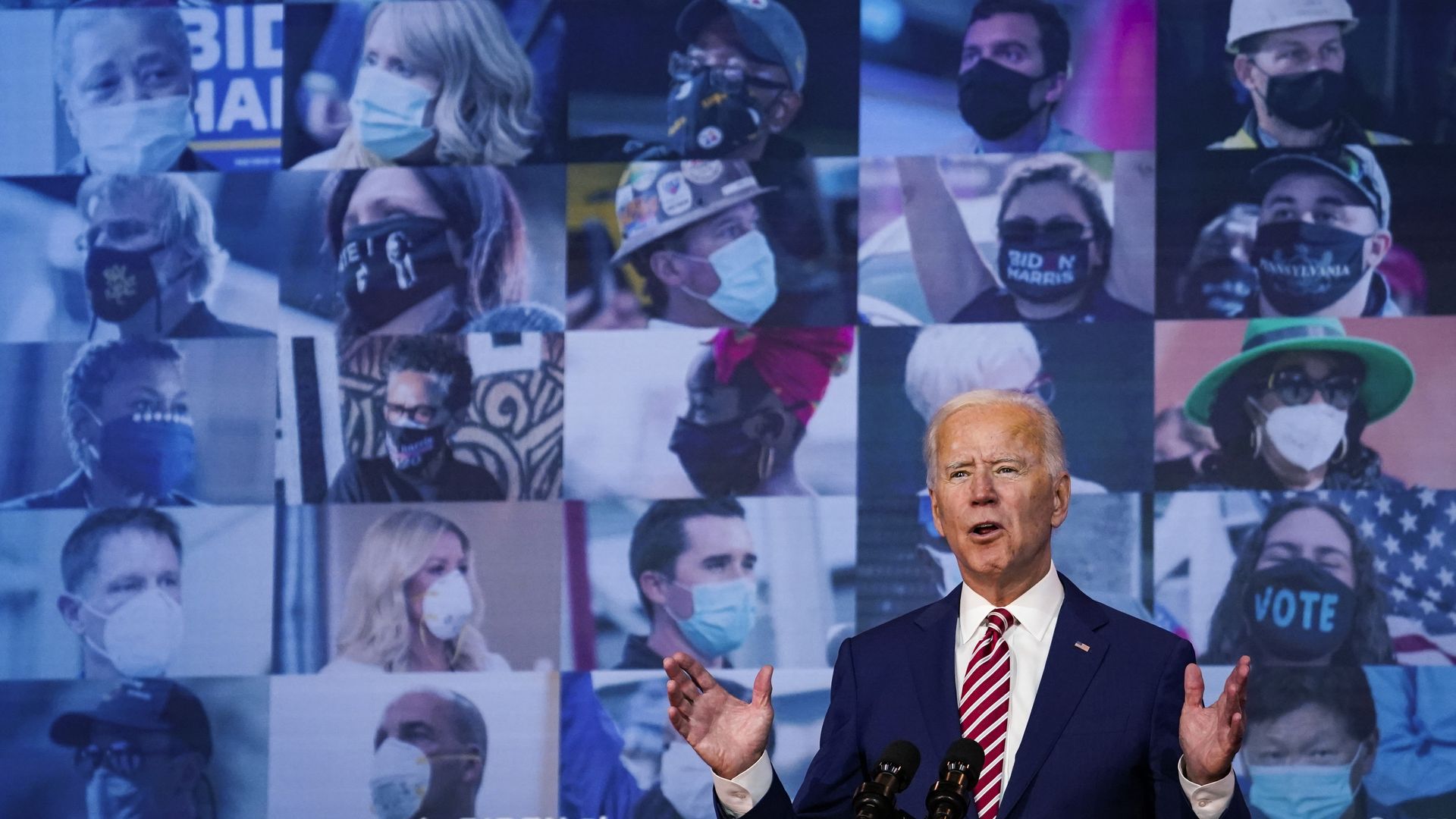 |
|
| Joe Biden speaks yesterday about "The Biden Plan to Beat COVID-19," at The Queen theater in Wilmington, Del. Photo: Drew Angerer/Getty Images |
| |
| This is one of the bigger signs of trouble for President Trump that I've seen in a poll: - Of the final debate's seven topics, Joe Biden won or tied on all seven when viewers in a massive Axios-SurveyMonkey sample were asked who they trusted more to handle the issue.
Why it matters: In a time of unprecedented colliding crises for the nation, those polls considered Biden to be vastly more competent. In the SurveyMonkey poll for Axios that included 2,322 U.S. adults who watched the debate or followed coverage of it, viewers expressed a clear preference for Biden on the environment (by 19 points) ... issues of special concern to women (18 points) ... the coronavirus (12 points) ... ethics in government (11 points) ... issues of special concern to Black Americans (7 points). - Biden won by 1 point on foreign policy. Trump won by 2 points on crime and safety — statistical ties in the poll, which had a 3-point margin of error.
How Democratic debate viewers saw Biden's performance: Graphic: SurveyMonkey for Axios How Republican debate viewers saw Trump's performance: Graphic: SurveyMonkey for Axios How viewers saw the debate overall: Graphic: SurveyMonkey for Axios Go deeper ... "Axios-SurveyMonkey poll: Trump improves, but not enough," by Margaret Talev. |
    |
| |
| |
| 2. Hunter dominates online debate |
 Data: NewsWhip. Table: Axios Visuals The mainstream media turned away. But online, President Trump's charges about Hunter Biden were by far the dominant storyline after the final presidential debate, Neal Rothschild writes from exclusive NewsWhip data. - Discussion of dealings by Joe Biden's son — and pre-debate allegations by one of Hunter's former business associates, Tony Bobulinski — garnered more than twice as much online action (likes, comments, shares) as the runner-up.
- The second-place topic — also pushed by Republicans — was the former vice president's comments on oil and fracking.
The backstory: The Hunter Biden laptop saga had been covered for 10 days by the N.Y. Post and Fox News, and mentioned frequently by Trump at his rallies. - Joe Biden said at the debate: "I have not taken a penny from any foreign source ever in my life."
Trump and his team had high hopes for an investigation by The Wall Street Journal. Trump said on a call with campaign staff Monday that The Journal was "working on an important piece," the N.Y. Times' Maggie Haberman tweeted. - But when the article posted as the debate ended, the findings about Hunter Biden and a Chinese venture undercut the Republican case: "Corporate records reviewed by The Wall Street Journal show no role for Joe Biden."
- Several Trump advisers told Axios they were angry about the outcome of The Journal's reporting.
Share this graphic. |
    |
| |
| |
| 3. America's worst COVID day |
 |
|
| A San Francisco homeowner takes a topical twist on decorating for Halloween. Photo: Justin Sullivan/Getty Images |
| |
| The U.S. set a daily record for new coronavirus cases, "as cases spread across communities in every region of the country including remote areas that hadn't yet been hard hit," as The Wall Street Journal put it. - Johns Hopkins reported 83,000+ new cases yesterday, eclipsing the last peak — 77,000+, on July 16.
The big picture: The U.S. uptick mirrors a similarly widespread spike in Europe, where London, Paris, Rome and other major cities are reining in nightlife. 🗞️ How it's playing ... |
    |
| |
| |
| A message from Facebook |
| We support updated internet regulations |
| |
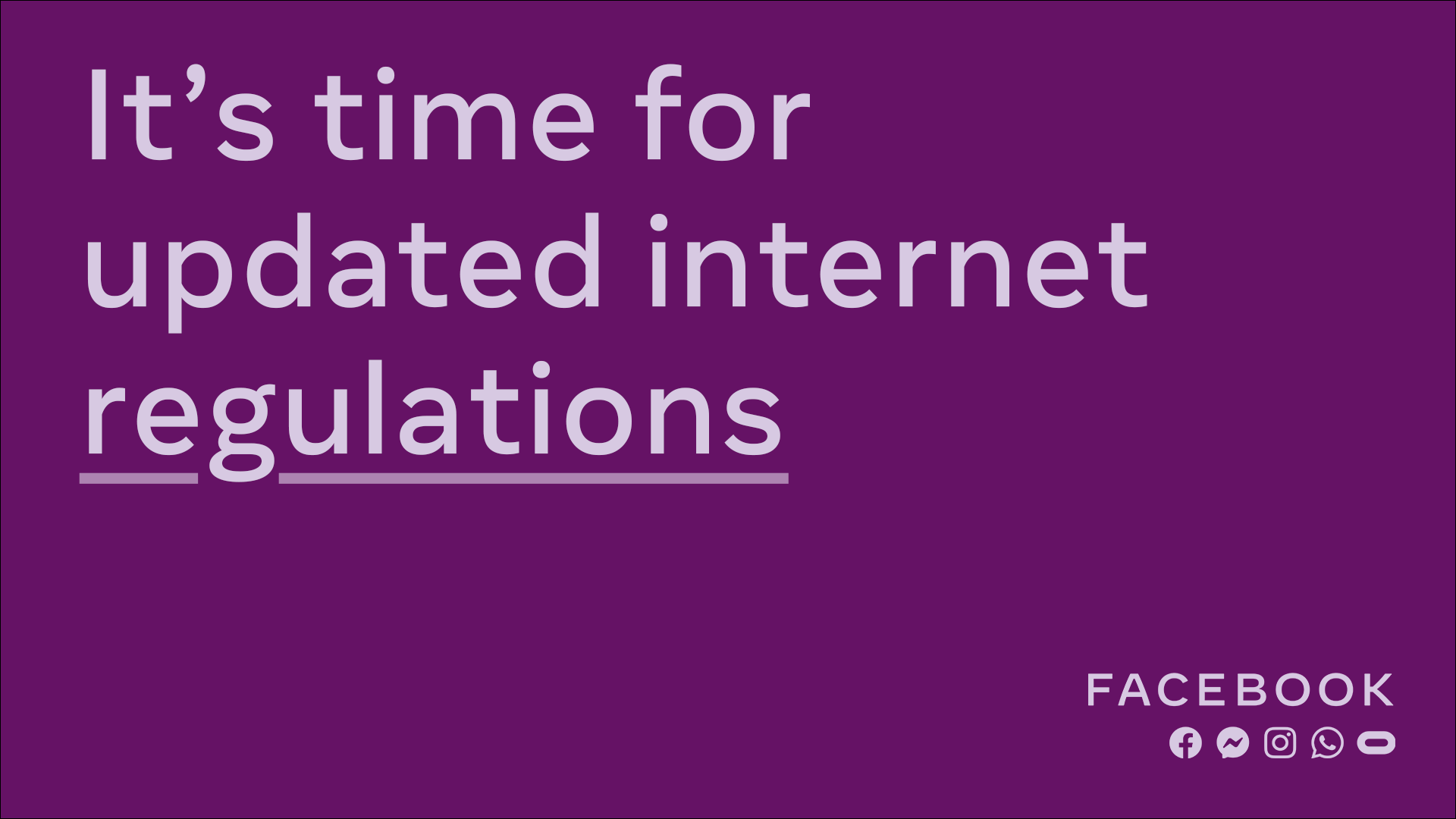 |
| |
| At Facebook, we continue to take steps to improve our platforms such as tripling our safety and security teams, building privacy tools, and more. Updated internet regulations will set standards for addressing today's toughest challenges. Read why we support updated internet regulations. |
| |
| |
| 4. Pic du jour: Work already underway for inauguration |
| Photo: Jon Elswick/AP Workers on the West Front of the U.S. Capitol were getting ready yesterday for the inauguration on Jan. 20 — 88 days from today. - Construction is taking place with the mindset that it's easier to scale down, if the coronavirus makes that necessary, than to scale up, Paige Waltz of the Joint Congressional Committee on Inaugural Ceremonies told AP.
|
    |
| |
| |
| 5. How ancient humans confronted climate change |
 |
|
| Drill site at the Koora Basin in Kenya. Photo: Human Origins Program, Smithsonian |
| |
| Environmental and climatic change in Africa hundreds of thousands of years ago drove human beings to adopt more sophisticated tools and broaden their trade networks, Axios Future author Bryan Walsh writes. - Why it matters: Humans possess no more important trait than our adaptability, which has enabled us to thrive in nearly every corner of the globe. With environmental and other changes coming at us swiftly, we'll need that adaptability even more in the future.
In a study published Wednesday in Science Advances, researchers analyzed the results of a sedimentary drill core that represented 1 million years of environmental history in the East African Rift Valley. - The lead author — Richard Potts, director of the Human Origins Program at the Smithsonian Institution — writes: "We conclude that the roots of Homo sapiens' evolutionary adaptations stem from our ability to adjust to environmental change."
Previous archaeological research found early humans in the area had used the same rudimentary stone axes for hundreds of thousands of years. - The drill core results showed the region began experiencing serious environmental and tectonic change about 400,000 years ago.
- Beginning around 320,000 years ago, humans in the region upgraded to more sophisticated tools and weapons and began employing early symbolic communication.
🔮Sign up here for Bryan Walsh's twice-weekly Axios Future. |
    |
| |
| |
| 6. Tweet du jour |
| |
    |
| |
| |
| 7. Investors hunt post-pandemic "reopening" plays |
| Courtesy Barron's "The pandemic and its restrictions have hurt Coke, which gets about half of its sales from restaurants, cafeterias, stadiums, and other places and events outside the home," Andrew Bary writes in Barron's (subscription). - But Coca-Cola is promising a "reopening" plan: "Coke benefits from rising living standards in the developing world. And ... the company generates about 75% of its profits outside the U.S."
Barron's also sees "a great operational turnaround story": - "Under its dynamic CEO of the past three years, James Quincey, Coke has largely sold off its company-owned bottling operations to franchisees, resulting in a capital-light business model."
🥞 PepsiCo, which includes Frito-Lay and Quaker Foods, is also thriving at home and around the world, CNBC reports, based on rising stay-at-home sales for snacks, pancake mix and more. |
    |
| |
| |
| 8. No spinning needle on Election Night |
How the world looked on NYTimes.com at 9:20 p.m. Nov. 8, 2016. The memory most likely to conjure Election Night 2016 nightmares for Democrats is The Needle, AP's David Bauder writes. - The Needle, a half-clock graphic by the N.Y. Times' Upshot, displayed in real time the candidates' probability of victory as votes were counted.
- Its gyrations triggered anxiety for Hillary Clinton supporters, who frantically refreshed the page, and elation for Trump fans.
The Needle won't be back Nov. 3 — one change in the world of election probability gurus following the 2016 shock. - The Times said in announcing its Election Day plans: "Given the changes in the ways voters cast their ballots this year, we anticipate that it may not be possible to declare a winner in a number of key states on election night."
Nate Silver's FiveThirtyEight used a number on Election Night four years ago (final forecast: 71% Clinton), but won't this year. - Silver said the change had more to do with uncertainties created by the high volume of early voting this year than any failures in 2016: "I just think people need to be exceptionally careful."
|
    |
| |
| |
| A message from Facebook |
| We support updated internet regulations |
| |
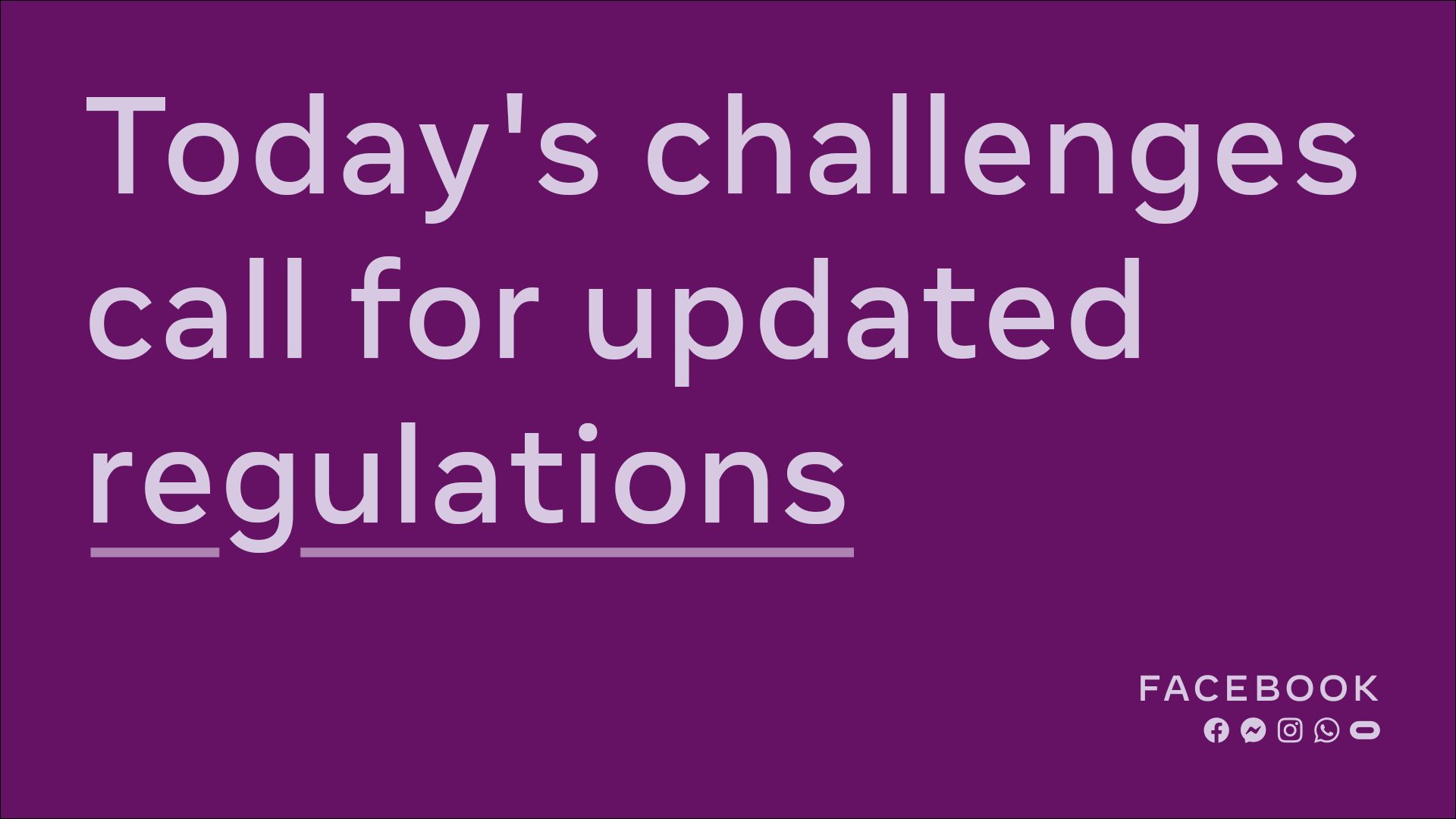 |
| |
We support new regulations that hold companies, including Facebook, accountable on issues including: - Combating foreign election interference.
- Protecting people's privacy.
- Enabling safe and easy data transfer between platforms.
Read why we support updated internet regulations. |
| |
| 📱 Thanks for starting your weekend with us. Invite your friends to sign up for Axios AM/PM. |










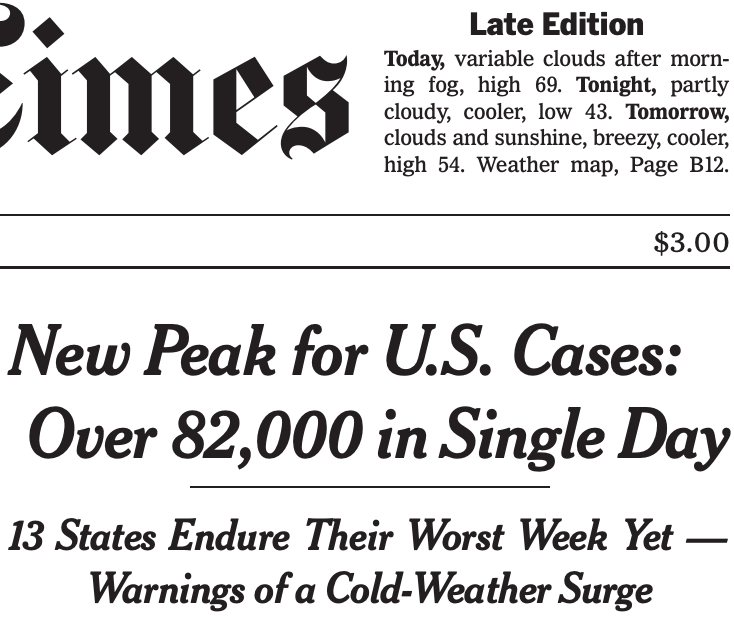
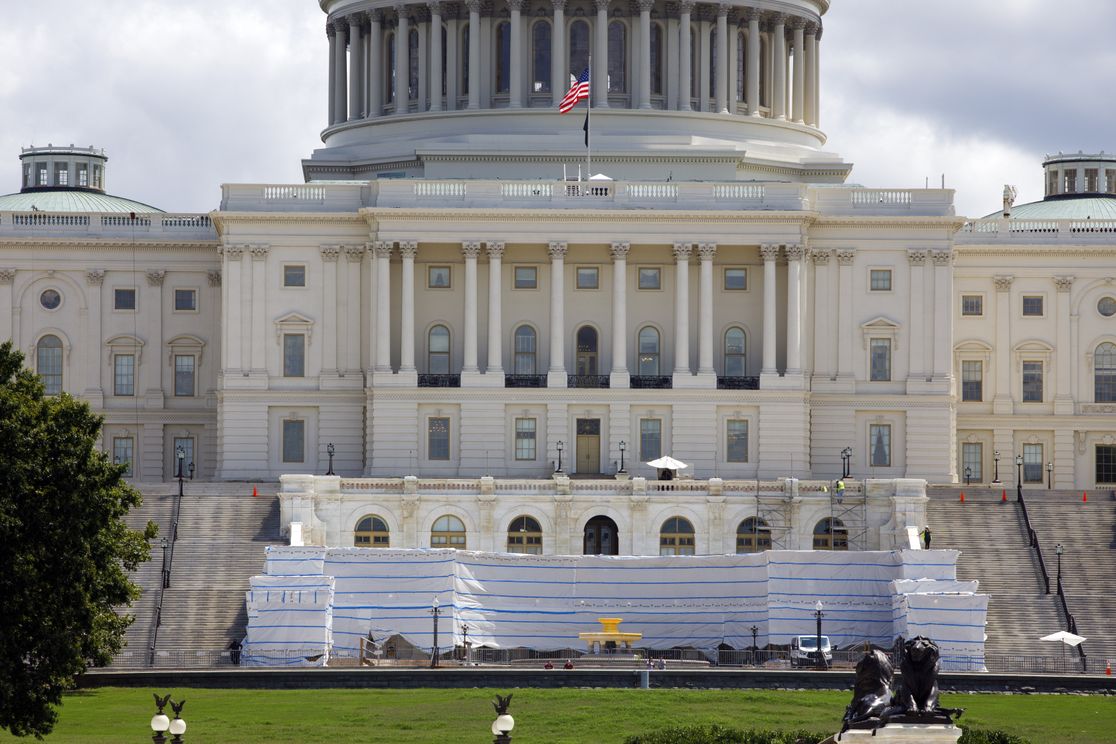

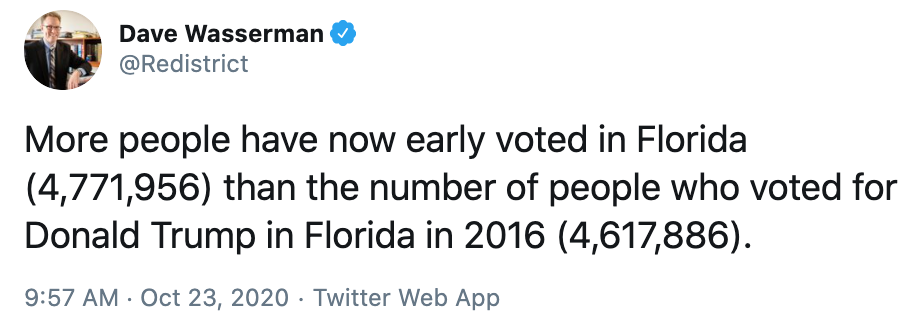

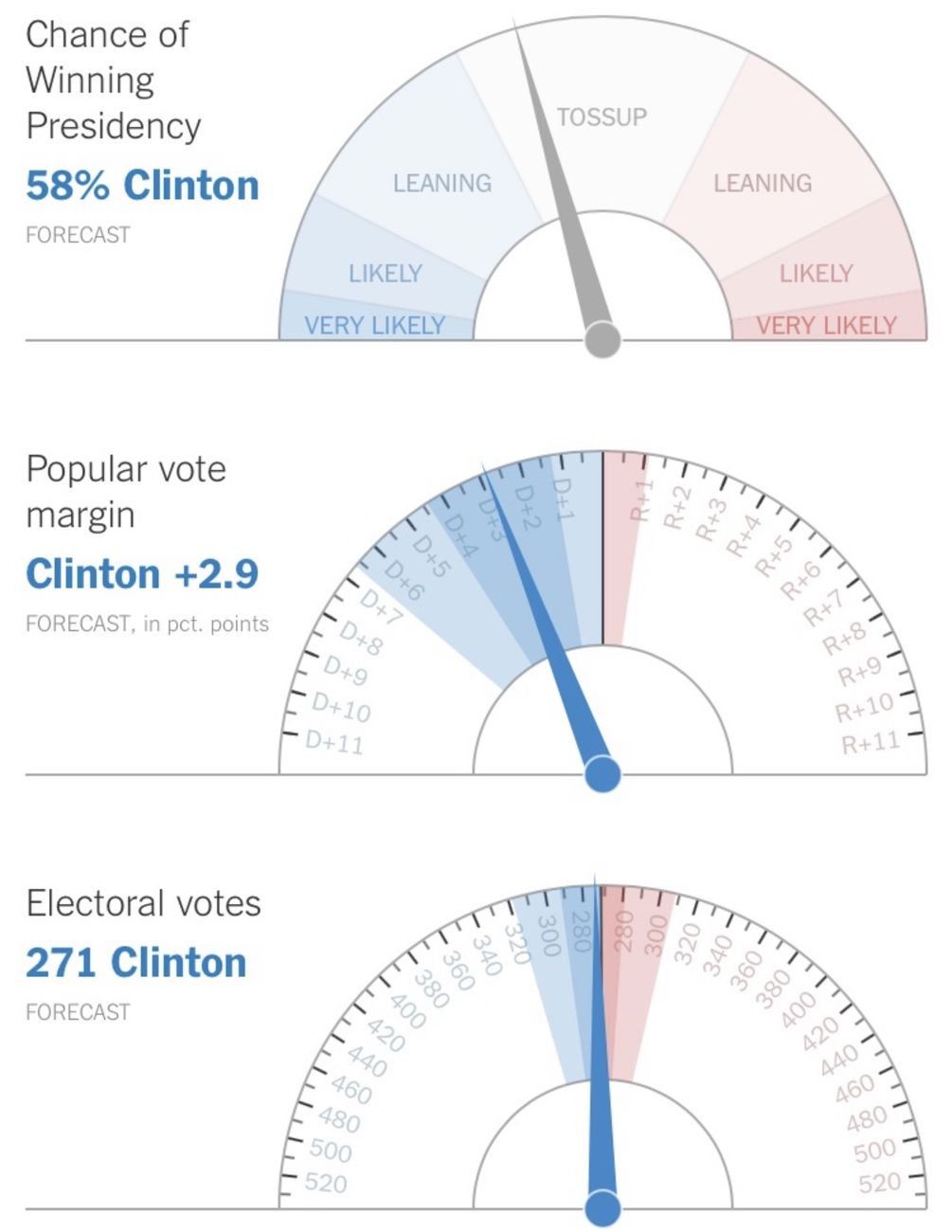
No comments:
Post a Comment